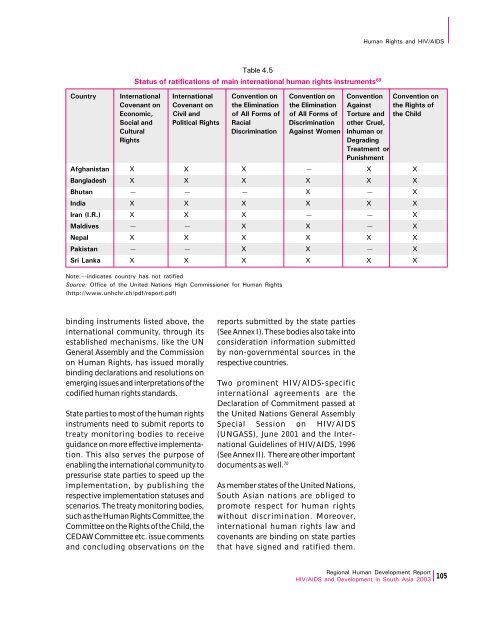Download Report - UNDP Asia-Pacific Regional Centre - United ...
Download Report - UNDP Asia-Pacific Regional Centre - United ...
Download Report - UNDP Asia-Pacific Regional Centre - United ...
You also want an ePaper? Increase the reach of your titles
YUMPU automatically turns print PDFs into web optimized ePapers that Google loves.
Human Rights and HIV/AIDSTable 4.5Status of ratifications of main international human rights instruments 69Country International International Convention on Convention on Convention Convention onCovenant on Covenant on the Elimination the Elimination Against the Rights ofEconomic, Civil and of All orms of of All orms of Torture and the ChildSocial and Political Rights Racial Discrimination other Cruel,Cultural Discrimination Against Women Inhuman orRightsDegradingTreatment orPunishmentAfghanistan X X X — X XBangladesh X X X X X XBhutan — — — X — XIndia X X X X X XIran (I.R.) X X X — — XMaldives — — X X — XNepal X X X X X XPakistan — — X X — XSri Lanka X X X X X XNote:—indicates country has not ratifiedSource: Office of the <strong>United</strong> Nations High Commissioner for Human Rights(http://www.unhchr.ch/pdf/report.pdf)binding instruments listed above, theinternational community, through itsestablished mechanisms, like the UNGeneral Assembly and the Commissionon Human Rights, has issued morallybinding declarations and resolutions onemerging issues and interpretations of thecodified human rights standards.State parties to most of the human rightsinstruments need to submit reports totreaty monitoring bodies to receiveguidance on more effective implementation.This also serves the purpose ofenabling the international community topressurise state parties to speed up theimplementation, by publishing therespective implementation statuses andscenarios. The treaty monitoring bodies,such as the Human Rights Committee, theCommittee on the Rights of the Child, theCEDAW Committee etc. issue commentsand concluding observations on thereports submitted by the state parties(See Annex I). These bodies also take intoconsideration information submittedby non-governmental sources in therespective countries.Two prominent HIV/AIDS-specificinternational agreements are theDeclaration of Commitment passed atthe <strong>United</strong> Nations General AssemblySpecial Session on HIV/AIDS(UNGASS), June 2001 and the InternationalGuidelines of HIV/AIDS, 1996(See Annex II). There are other importantdocuments as well. 70As member states of the <strong>United</strong> Nations,South <strong>Asia</strong>n nations are obliged topromote respect for human rightswithout discrimination. Moreover,international human rights law andcovenants are binding on state partiesthat have signed and ratified them.<strong>Regional</strong> Human Development <strong>Report</strong>HIV/AIDS and Development in South <strong>Asia</strong> 2003 105
















